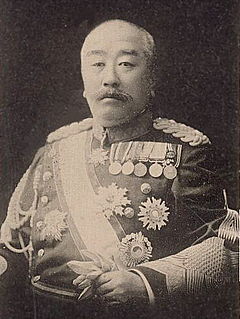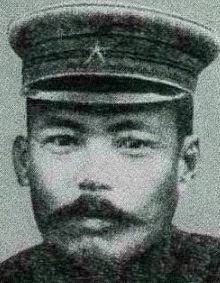 W
WPrince Fushimi Sadanaru was the 22nd head of the Fushimi-no-miya shinnōke. He was a field marshal in the Imperial Japanese Army.
 W
WViscount Ogawa Mataji was a general in the early Imperial Japanese Army. He was also the father-in-law of Field Marshal Gen Sugiyama.
 W
WNaozaburō Okabe was a General in the Imperial Japanese Army, who commanded the Japanese Sixth Area Army from November 1944 until the end of World War II.
 W
WBaron Ōkubo Haruno was a general in the early Imperial Japanese Army.
 W
WViscount Ōsako Naoharu was a general in the early Imperial Japanese Army. He was the older brother of General Ōsako Naomichi.
 W
WŌsako Naomichi was a general in the early Imperial Japanese Army. He was the younger brother of General Ōsako Naoharu.
 W
WViscount Ōshima Hisanao was a general in the early Imperial Japanese Army.
 W
WViscount Ōshima Yoshimasa was a general in the early Imperial Japanese Army during the First Sino-Japanese War and the Russo-Japanese War. His great-great-grandson, Shinzō Abe was Prime Minister of Japan.
 W
WViscount Saitō Makoto, GCB was a Japanese naval officer and politician. Upon distinguishing himself during his command of two cruisers in the First Sino-Japanese War, Saitō rose rapidly to the rank of rear admiral by 1900. He was promoted to vice admiral during the Russo-Japanese War in 1904. After serving as Minister of the Navy from 1906 to 1914, Saitō held the position of Governor-General of Korea from 1919 to 1927 and again from 1929 to 1931. When Inukai Tsuyoshi was assassinated in May 1932, he took his place as Prime Minister and served one term in office. Saitō returned to public service as Lord Keeper of the Privy Seal in February 1935 but was assassinated only a year later during the February 26 Incident.
 W
WBaron Samejima Shigeo was a general of the Imperial Japanese Army during the Russo-Japanese War.
 W
WShiba Gorō was a samurai of Aizu Domain and later a career officer and general in the Meiji period Imperial Japanese Army.
 W
WYoshinori Shirakawa was a general in the Imperial Japanese Army.
 W
WBaron Tatsumi Naofumi was a samurai form Kuwana Domain in the Bakumatsu period Tokugawa shogunate and later a general in the Imperial Japanese Army during the Meiji period.
 W
WBaron Tsuchiya Mitsuharu was a general in the early Imperial Japanese Army.
 W
WBaron Tsukamoto Katsuyoshi was a lieutenant general in the early Imperial Japanese Army.
 W
WBaron Uchiyama Kojirō was a general in the early Imperial Japanese Army.
 W
WBaron Ueda Arisawa was a general in the early Imperial Japanese Army.
 W
WViscount Uehara Yūsaku was a field marshal in the Imperial Japanese Army. His wife was a daughter of General Nozu Michitsura. He was the founder of the Imperial Japanese Army Engineering Corps.
 W
WUmezawa Michiharu was a Bakumatsu period Japanese samurai who went on to become a general in the Meiji period Imperial Japanese Army.
 W
WYoshijirō Umezu was a Japanese general in World War II and Chief of the Army General Staff during the final years of the conflict. He was convicted of war crimes and sentenced to life imprisonment.
 W
WBaron Uryū Sotokichi was an early admiral of the Imperial Japanese Navy, active in the Russo-Japanese War, most notably at the Battle of Chemulpo Bay and the Battle of Tsushima. His name has sometimes been transliterated as "Uriu Sotokichi", or "Uriu Sotokitchi", a transliteration of older kana spelling. The spelling is different by current accepted methods of transliteration, but the pronunciation is the same as the modern spelling for Uryū (うりゅう). He was a lifelong proponent of better ties with the United States.
 W
WMitsuru Ushijima was a Japanese general who served during the Second Sino-Japanese War and World War II. He was the commanding general of the 32nd Army, which fought in the Battle of Okinawa during the final stages of the war. Ushijima's troops were defeated, and at the end of the battle he committed suicide.
 W
WYamanashi Hanzō was a general in the Imperial Japanese Army, Army Minister and Governor-General of Korea from 1927 to 1929.
 W
WYui Mitsue was a general in the Imperial Japanese Army during the First Sino-Japanese War and Russo-Japanese War.